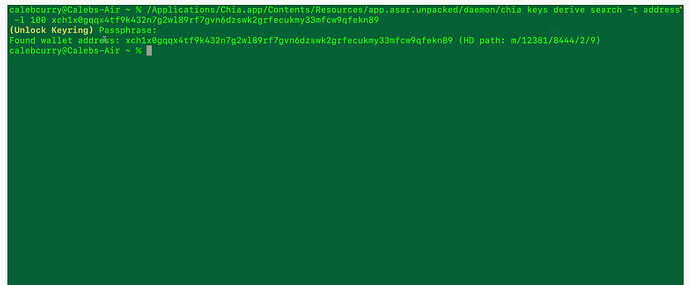hello
I was watching a video on youtube about the changes of chia 1.3 but i dont understand the use of command chia keys derive search -t address and the result of that search, i am confused
Anyone can explain please
thank you
It shows your wallet address, doesn’t it?
You would use this if you weren’t sure a wallet address belonged to your key (for example, the xch_target_address in your config.yaml). The output shown here indicated that it found the given wallet address in the first 100 derived keys from this client’s private key, then it shows the HD path, where all the keys will share the first parts m/12381/8444, and then child keys will be located under the remaining 2 parts, with /2 being the default wallet location, and /9 indicating that this was the 9th derived wallet address.
This command as written will show “observer” keys, there’s a good chance that your xch_target_address is a non-observer key, so you would need to include the -d option in the first command to have it search non-observer derived addresses, which would then show the HD path m/12381n/8444n/2n/9n if it were the 9th non-observer address.
thank yuo for your answer.
What do you mean with non-observer key ?
Didn’t know that too, thx!
In 1.3/light wallet, chia added a new method for deriving keys that will allow (in the future when someone makes it) a view only client to use an observer public key to view a wallet’s entire balance, instead of having to manually track every wallet receive address. That way you can view your wallet or let someone else view your wallet without needing to input your 24 words.
All keys derived before 1.3/light wallet beta were non-observer keys, and are differentiated in the HD path by the letter n. If you were to give your accountant an observer public key to view your balance, but still had some coins associated with non-observer addresses (didn’t send entire balance to a new observer receive address) then your accountant wouldn’t be able to see some of those coins.
